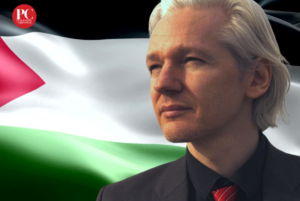📷Wikileaks founder Julian Assange | The Palestine Chronicle
Wikileaks founder Julian Assange is finally free after spending nearly seven years trapped in Ecuador’s London-based embassy, followed by 1,901 days in Belmarsh prison, concluding a legal battle dating back 14 years with a plea deal with the US Department of Justice.
Known internationally as a revealer of inconvenient truths and a political prisoner of the West, Assange had profound impacts on almost all corners of the globe, including the Arab World.
The sensitive government cables that were released by Wikileaks were well known to have had a major impact on the Arab World in its entirety, pivotally important in influencing the discourse of the 2011 Arab Spring that began in Tunisia.
Assange’s Freedom
However, the specific implications of leaks pertaining to the Palestine-Israeli conflict have been of tremendous value also.
“Assange’s freedom represents a watershed moment in the struggle against war, government corruption, corporate greed, and much more,” Palestinian analyst and editor of the Palestine Chronicle, Ramzy Baroud, commented on the release of Assange.
“His imprisonment and besiegement for all of those years were meant to be a lesson for the rest of us, that there are forces much stronger than our collective push for global justice, freedom and transparency. But that attempt has terribly failed, as we, led by Assange, will surely emerge even more determined to carry on with the fight for an equal and a better world,” Baroud added.
“As Palestinians, who are constantly silenced by Western government and media for daring to demand our rights, and for calling for accountability to Israel’s ongoing genocide in Gaza, the fight for the truth is critical to our very survival. As we celebrate Assange’s freedom, we must remember that thousands of Palestinians and truth-seeking activists all over the world remain in prison,” he continued.
Secret Classified Cables
One of the various contributions of Wikileaks to Palestine were cables that worked to confirm an element of Israel’s agenda in the Gaza Strip, aiding in shaping our overall understanding of the reality on the ground today during the genocidal assault launched by the Israeli government.
Secret classified cables, from March 2008, revealed that US diplomats had learned that Tel Aviv’s intentions with its comprehensive siege imposed upon the Gaza Strip, were “to keep the Gazan economy functioning at the lowest level possible consistent with avoiding a humanitarian crisis”.
What we came to learn from the leaked documents was a confirmation that Israel was pursuing the strategy outlined in 2006 by Dov Weisglass, a senior advisor to Israeli Prime Minister at the time Ehud Olmert, who talked of putting the “Palestinians on a diet, but not to make them die of hunger.”
In 2012 it was later revealed that in 2008 a calorie estimation chart was drawn up in order to deprive Palestinians in Gaza of food, but not to the point of absolute starvation. According to the Wikileaks released cables, this was part of a strategy to make life unbearable and slowly cause a decline in the economy of Gaza, but maintain a situation which would contain a massive explosion of the situation.
In 2011, Wikileaks cables also corroborated the Al-Jazeera leaked ‘Palestine Papers’ which exposed the depth of the collusion between corrupt officials belonging to the Palestinian Authority and their Israeli counterparts.
Another important revelation that emerged from Wikileaks documents was the close ties between Israel and foreign governments in the Muslim World, such as the regime in Azerbaijan, shaping how the public interprets these close ties.
In the cases of Syria and Egypt, Wikileaks also revealed the nature of Israeli security concerns during the unrest that took place during the Arab Spring, allowing us to get a better glimpse into Tel Aviv’s agendas in the surrounding Arab nations.
On top of this, Wikileaks cables revealed that former US Secretary of State, Colin Powell, had spoken on his knowledge of Israeli nuclear weapons and said that Israel had 200 nuclear weapons pointed at the Islamic Republic of Iran.
This was a major revelation as it was the first acknowledgment from an American leading official of Israeli nuclear weapons capabilities, which Washington and Tel Aviv refuse to comment on publicly; largely due to Israel’s refusal to sign onto the nuclear non-proliferation treaty.
In addition to this, Julian Assange himself has never shied away from talking to everyone and exposing all relevant information to a multitude of conflicts. Pertaining to the conflict in Palestine, Assange famously conducted an interview with the leader of Lebanese Hezbollah, Seyyed Hassan Nasrallah, who he questioned on the reasons behind the group’s resistance against Israel and the group’s stances in favor of Palestinian rights.| via The Palestine Chronicle
This article ‘Revealer of Inconvenient Truths’ – Julian Assange’s Impact on Palestine was originally published in The Palestine Chronicle.




